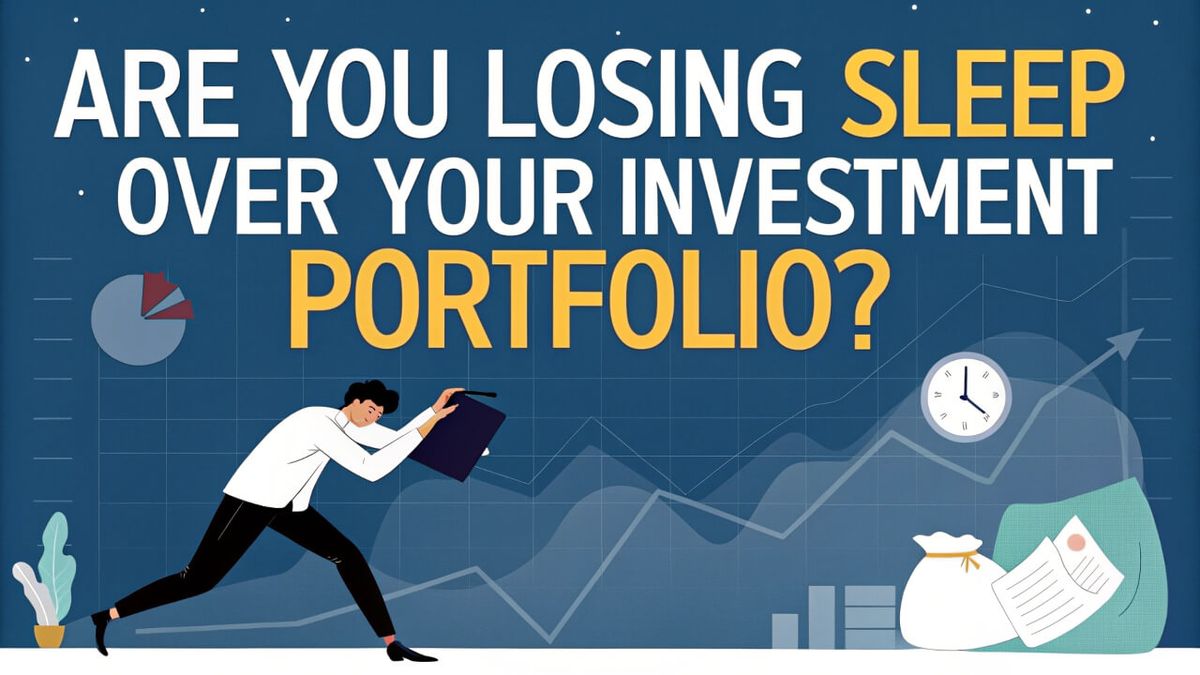
All is quiet in the house, and the world outside is still, but your mind is racing a million miles per hour. You're not thinking of tomorrow's meetings or what you might make for dinner; but only red arrows, green arrows. Mentally refreshing your portfolio, replaying the latest economic news, and contemplating if that really was the right decision for your future. If you have followed that story so far, you are not alone.
Financial stress is not just a faint shadow over your mind; it is an incredibly acute physiological force that may entirely affect your health. It is powerful enough to set off an ancient "fight or flight" reaction within our bodies, flooding our systems with stress hormones such as cortisol and adrenaline. This post is for a person who has been staring up at the ceiling thinking about whether investments are safe.
Steering Through the Stormy Waters of Market Volatility
Market volatility is the term that exasperates investors and brings his or her nerves. This real-time market data is available through our mobile phones 24/7. This kind of connectivity also makes it safe to be engrossed with short-term movements, losing all sight of our long-range objectives. Obsession with particular indicators might well be the downfall of many; all their highs and lows cling on to these indicators. The daily movement of gold prices may seem like a sufficient indicator of the health of the entire economy. Seeing a commodity that should supposedly act as a hedge dip gives rise to an irrational degree of fear.
This loop of look-worry-look again keeps the nervous system zinged up in hyper-alert mode. By the time your head hits the pillow, your brain cannot simply turn off anymore. Instead, it goes on processing and contemplating the day's financial news. Churning over financial concerns keeps you awake and breaks the mending sleep you so desperately need. The key shouldn't be not to look at the market but to tame the emotional and physiological reactions it inevitably triggers. It implies fostering a healthier bond with financial information where you are the one in control of your data and not the other way around.
The Burden of Big Decisions
Stress beyond the daily market-watching grind opens the more prolonged, heavier stresses of making some really significant long-term financial commitments. These are the decisions that bear down on you for decades to come, and the weight of them can be terrifying. Retirement, for instance, hangs over you like a huge bunch of complex strategies and instruments that you have a massive responsibility for. Setting up a fully funded retirement plan is excellent; however, the intricacies of those avenues can become a source of great and permanent worry.
You are also left with thinking about more advanced strategies like something serious, such as SMSF lending to acquire property for your self-managed super fund. This one does not fall under the everyday transaction category; this one needs a lot of planning, checks ticking against fine lines of legislation, and looks into a long view. This can bring about serious money; however, the road is heavy on conscience; What if it goes wrong with the property market? What if the rules have been changed? Am I doing it correctly? Those questions might be high stakes, but you will not start dismissing them quietly and going to bed. Those voices will ring out in the eerie hours while stealing away the deep, restorative sleep your body and mind require.
From Stressed to Rested: Your Action Plan for Better Sleep

Fortunately, you're able to take back control. The goal is to build a little buffer between financial life and personal well-being. This isn't financial advice; rather, they're habits centred around health that safeguard your peace of mind.
- Create a "financial wind-down" routine. Just like the experts tell you to avoid screens before bed, decide on a hard-and-fast cut-off time for checking your portfolio, reading about market news, or talking about finances. Give your brain a couple of hours to really let go of money and get into a resting mode.
- Develop mindful detachment. When you feel like your thoughts are spinning about finances or are filled with worry about money, try this simple mindfulness practice. Acknowledge the thought without judgement, assign a name to it ("that's a thought about my portfolio"), and then bring your attention back to your breath. This creates some space between you and the anxious thoughts, helping you realise you are not your portfolio's performance.
- Focus on what you can control. You can't control global markets, but you do control your strategy, your budget, and when you engage with financial news. Shifting your attention to those things that you can control will go a long way in developing an empowering feeling of control.
- Prioritize your physical health. Last, but not least, don't forget to keep your health up. Exercise regularly to burn off excess stress hormones. Eat well so your mood stays steady and your energy is optimal. A strong, healthy body is a resilient mind ready to weather the worst kinds of stress.
Invest in Your Rest
Your most valuable asset won't be a stock, a bond, or a piece of property; it is your health. Without it, none of the rest matters. Therefore, while a crucial area to consider in shaping your financial future, they are not allowed to take away from your present-day enjoyment. Staying up late focusing on your portfolio is an absolute sign of something going wrong. When you start recognising what sets you off, altering what you see, hear, or read about finances, and concentrating on the health aspects of standing back from all of that craziness, and you begin to calm down the storm building in your head, your nights will start shifting from a stressful mess to one of elegant tranquility. It's not truly about building more money; wealth means financial security and a calm heart to enjoy it.